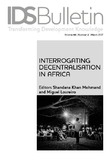Is Election a Disadvantage? Nigerian Local Councils and Security Provision
| dc.contributor.author | Ojebode, Ayobami | |
| dc.contributor.author | Onyishi, Ernest | |
| dc.contributor.author | A. Aremu, Fatai | |
| dc.date.accessioned | 2017-03-22T10:30:05Z | |
| dc.date.available | 2017-03-22T10:30:05Z | |
| dc.date.issued | 2017-03-22 | |
| dc.identifier.uri | https://opendocs.ids.ac.uk/opendocs/handle/20.500.12413/12871 | |
| dc.description.abstract | Deepening democracy through local elections is a major aim of decentralisation. But do elections always work to strengthen the relationship between local politicians and citizens, or can they set elected officials up for failure? This article examines security provisioning by local governments in Nigeria, understanding that some local governments are elected, while others are appointed by state governors. Our hypothesis was that elected local councils should be better rated than those that are appointed. By looking at local government areas that differ mainly in terms of whether their council is elected or appointed, we found that local elections are not enough singly to build strong connections between democratically elected local politicians and citizens. Democratic decentralisation in the context of limited financial resources, and limited autonomy vis-à-vis state governors and political bosses, can set elected governments up for failure to the extent that they are viewed as worse performers than their appointed counterparts. | en |
| dc.language.iso | en | en |
| dc.publisher | Institute of Development Studies | en |
| dc.relation.ispartofseries | IDS Bulletin;48.2 | |
| dc.rights | This is an Open Access article distributed under the terms of the Creative Commons Attribution Non Commercial 4.0 International licence, which permits downloading and sharing provided the original authors and source are credited – but the work is not used for commercial purposes. http://creativecommons.org/licenses/by-nc/4.0/legalcode | en |
| dc.rights.uri | http://creativecommons.org/licenses/by-nc/4.0/ | en |
| dc.subject | Governance | en |
| dc.subject | Security and Conflict | en |
| dc.title | Is Election a Disadvantage? Nigerian Local Councils and Security Provision | en |
| dc.type | Series paper (IDS) | en |
| dc.rights.holder | Institute of Development Studies | en |
| dc.identifier.team | Governance | en |
| dc.identifier.doi | 10.19088/1968-2017.115 | |
| dcterms.dateAccepted | 2017-03-22 | |
| rioxxterms.funder | Default funder | en |
| rioxxterms.identifier.project | Default project | en |
| rioxxterms.version | VoR | en |
| rioxxterms.funder.project | c941507f-fd0b-4fc3-9822-4b2132f61a1d | en |
Files in this item
This item appears in the following Collection(s)
Except where otherwise noted, this item's license is described as This is an Open Access article distributed under the terms of the Creative Commons Attribution Non Commercial 4.0 International licence, which permits downloading and sharing provided the original authors and source are credited – but the work is not used for commercial purposes. http://creativecommons.org/licenses/by-nc/4.0/legalcode


